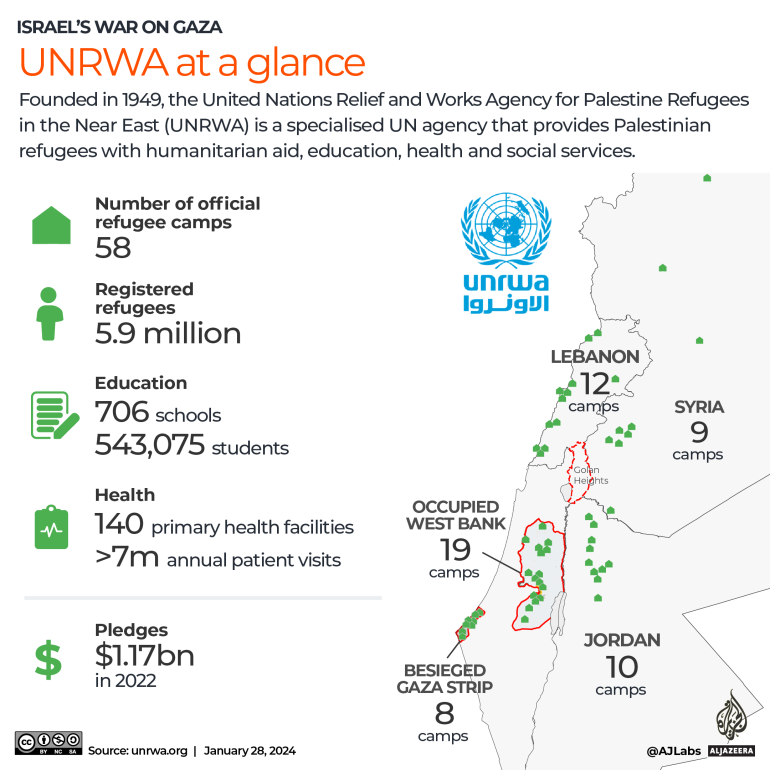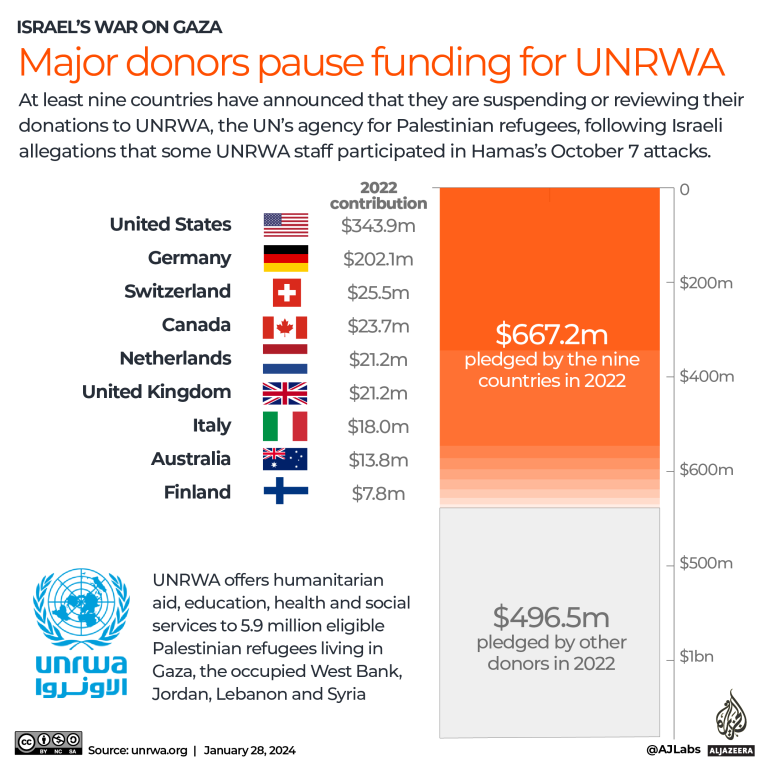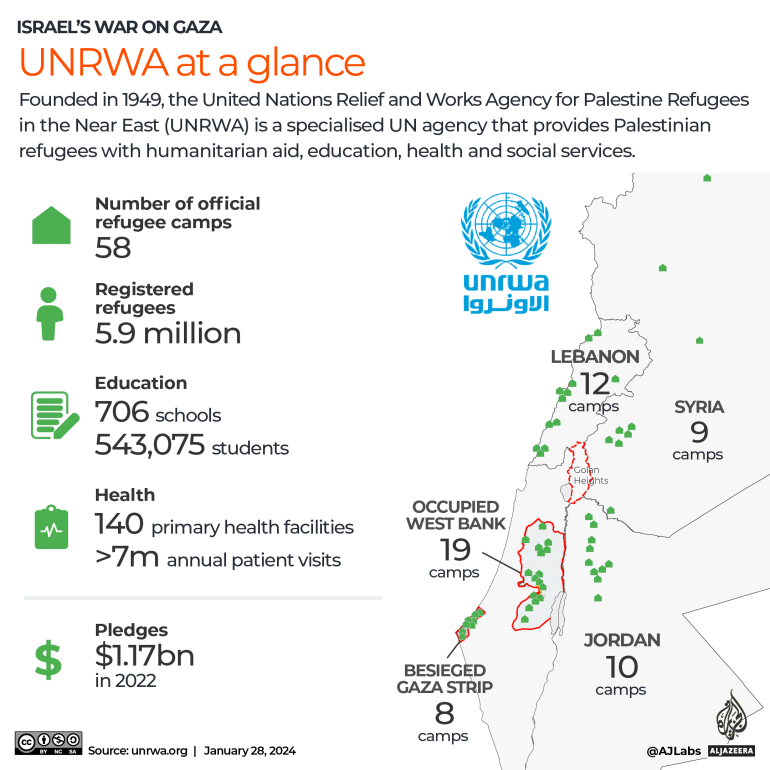The UNRWA chief Philippe Lazzarini has dubbed the steps to suspend funding an “additional collective punishment” for Palestinians already reeling from nearly four months of non-stop Israeli bombardment.
The termination of aid came swiftly after Israel accused 12 UNRWA staff of involvement in the October 7 Hamas attack inside Israel. The UN has taken action against UNRWA staff linked to the attack, but has voiced its opposition to the defunding.
“As the war in Gaza is being pursued unabated, and at the time the International Court of Justice calls for more humanitarian assistance, it is the time to reinforce and not to weaken UNRWA,” Lazzarini said in a statement on Thursday.
“If the funding remains suspended, we will most likely be forced to shut down our operations by end of February not only in Gaza but also across the region.”
Israeli allegations still not verified
The Palestinians have accused Israel of falsifying information to tarnish UNRWA in Gaza, which employs 13,000 people, who run schools, healthcare clinics and other essential services. Experts have said the Israeli allegations remain unverified.
UN spokesperson Stephane Dujarric said on Tuesday that Israel has not yet shared the intelligence dossier with the UN.
Yasmine Ahmed, the UK director of Human Rights Watch (HRW), told Al Jazeera that HRW is not aware that the UN, or in any of the states that fund UNRWA, have seen any written documentation of evidence that establishes what has been alleged by Israel.
“That is not to say that that has not been provided,” she added.
Ahmed said that HRW has asked the UK government what written evidence they saw of the allegations that led them to suspend the funding.
Here is more about the UNRWA and how critical it is to Palestinians, particularly in Gaza.
Why was UNRWA created?
UNRWA was created by the UN General Assembly on December 8, 1949, to provide basic support including food, healthcare and education to tens of thousands of Palestinian refugees. More than 700,000 Palestinians were forcefully displaced leading up to Israel’s creation in 1948, which Palestinians remember as the Nakba, or “the catastrophe”.
The UNRWA operations are spread across the occupied West Bank – including East Jerusalem, the Gaza Strip, Syria, Lebanon and Jordan.
What does it do?
UNRWA supports some six million Palestinian refugees who live within and outside Palestine. It is like a quasi-state providing direct services, such as schools, primary health centres and other social services. It also provides loans to Palestinians.
However, it does not run refugee camps, as the maintenance of law and order and security are not part of its mandate.
UNRWA operates separately from the United Nations High Commissioner for Refugees (UNHCR), which was also established in 1949. While UNHCR provides temporary protection and assistance to refugees, it does not have a mandate over Palestinian refugees within the UNRWA fields of operations.
Although it provides humanitarian aid to Palestinians, the UNRWA body does not have a mandate to resettle Palestine refugees, which Israel opposes.
In 2021, about 545,000 children were enrolled in UNRWA schools; Social Safety Net Programme (SSNP) assistance reached 398,044 beneficiaries; and 1.7 million received critical humanitarian aid.

Why is it important for Palestinians?
UNRWA helps Palestinians in multiple ways, providing them with multiple resources.
Since Israel launched its war on Gaza on October 7, approximately a million Palestinians from Gaza, or nearly 45 percent of the enclave’s population, have been sheltering in UNRWA schools, clinics and other public buildings. UNRWA schools and buildings operate beyond capacity to provide shelter to internally displaced Palestinians who have very limited safe spaces to go to.
Nearly the entire population in Gaza now relies on UNRWA for basic necessities, including food, water and hygiene supplies.
The UN agency employs thousands of Palestinians in its schools, healthcare centres and other social programmes providing much-needed employment opportunities to Palestinians living under Israeli occupation for the past seven decades.
More than 30,000 Palestinians in the Gaza Strip, West Bank and in vast refugee camps in neighbouring Arab countries work for the UNRWA. Its services in Gaza have increased in importance since 2005, when Israel and Egypt imposed a blockade causing an economic collapse with one of the highest unemployment rates in the world.
In December 2023, the International Labour Organisation and the Palestinian Statistics Bureau determined that at least 66 percent of employment was lost in Gaza since the war broke. UNRWA helps curb the unemployment gap among Palestinians by providing them with employment.
Who are the biggest donors to UNRWA?
In 2022, the UNRWA’s top government donors were the US, Germany, the European Union, Sweden, Norway, Japan, France, Saudi Arabia, Switzerland and Turkey.

The US, Germany and Switzerland have suspended funding to UNRWA following the allegations.
The European Union (EU) announced on Monday that it would review whether it could continue to fund UNRWA in light of the allegations. However, the body does not foresee any additional funding for the organisation until the end of February.
Norway, one of the top donors, urged fellow donor countries to reflect on the wider consequences of the funding cuts.
“UNWRA is a vital lifeline for 1.5 million refugees in Gaza. Now more than ever, the agency needs international support. To avoid collectively punishing millions of people, we need to distinguish between what individuals may have done and what UNRWA stands for,” Espen Barth Eide, the Norwegian foreign minister, told Reuters on Wednesday.

How many camps and Palestinian refugees does UNRWA have?
- In Gaza, 1,476,706 Palestinians are registered as refugees in eight Palestinian refugee camps.
- In the occupied West Bank, about a quarter of 871,537 registered refugees live in 19 refugee camps, while others live in towns and villages.
- There are nine official and three unofficial camps in Syria, where 575,234 registered Palestine refugees live.
- 489,292 Palestinian refugees live in Lebanon’s 12 refugee camps.
- 2,307,011 refugees live in Jordan, where there are 10 UNRWA camps. There are three unofficial camps and other refugees live around the camps.
What does the aid freeze mean for Palestinians?
Now that UNRWA’s biggest donors have frozen aid to it, there is a dire starvation threat to Palestinians in and outside of Gaza.
“It’s difficult to imagine that Gazans will survive this crisis without UNRWA,” said Thomas White, director of UNRWA Affairs in Gaza and UN deputy humanitarian coordinator for the occupied Palestinian territory.
“Rafah has become a sea of people fleeing bombardments,” he said, referring to the relentless Israeli bombing that has destroyed more than 70 percent of the houses in Gaza and displaced nearly two million people.
Why does Israel want to weaken UNRWA?
Israel has long advocated for the dismantling of UNRWA, arguing that its mission is obsolete. On Monday, Israeli Prime Minister Benjamin Netanyahu claimed that UNRWA is “perforated with Hamas”.
Netanyahu’s accusations against UNRWA have not been backed by facts. His assertion that UNRWA has been infiltrated by Hamas has been questioned because the UN agency shares the list of its staff with Israel.
“Every year, UNRWA shares its list of staff with the host countries where it works,” said Stephane Dujarric. “For the work that it does in Gaza and the West Bank, UNRWA shares the list of staff with both the Palestinian Authority and with the Israeli government, as the occupying power for those areas.”
Israel has long sought to end UNRWA, arguing that the UN body “perpetuated” the issue of Palestinian refugees because it allows Palestinians to transfer refugee status across generations and Israel has refused to accept the right of return to these refugees.
Israel’s recent allegations towards UNRWA employees surfaced the same day as the ICJ’s interim ruling ordering Israel to prevent genocidal acts and scale up aid to Gaza.
“I don’t think it is coincidental that these allegations came out immediately after the ICJ ruling,” said Diana Buttu, a Palestinian legal expert in international law. “It is designed to deflect from the ICJ ruling and focus the attention on UNRWA and to undermine any attempts to hold Israel accountable or stop the genocide.”
Former UK Ambassador to Uzbekistan Craig Murray wrote that accusations against the 12 UNRWA staff members “provide a propaganda counter-narrative to the ICJ judgment, and to reduce the credibility of UNRWA’s evidence before the court”.
Incredible. The BBC just led their news with an 8 minute long segment on the unevidenced allegations of UNRWA staff involvement with Hamas.
Far greater coverage than they gave to the ICJ interim ruling that Israel is plausibly committing genocide.
The BBC is an utter disgrace.— Craig Murray (@CraigMurrayOrg) January 28, 2024
Israel also wants to eliminate UNRWA to force Palestinians in Gaza and the West Bank to migrate elsewhere out of desperation, according to Zaid Amali, a UNRWA cardholder and a civil society activist in the West Bank.
There is evidence that Israel has consistently tried to forcefully displace Palestinians, aside from the long history of state-backed settlers displacing Palestinians from the West Bank and East Jerusalem, Israeli ministers Itamar Ben-Gvir and Bezalel Smotrich have recently reiterated ideas for Palestinians “voluntarily migrating” out of Gaza, an euphemism for forced displacement.
“This step of targeting UNRWA feeds into this overall goal of displacing more Palestinians [from their land] in order to build more illegal settlements,” he told Al Jazeera.
